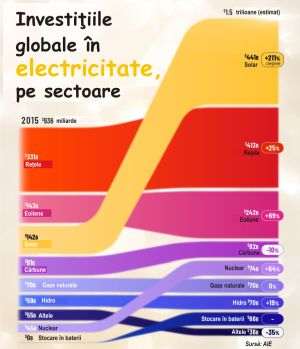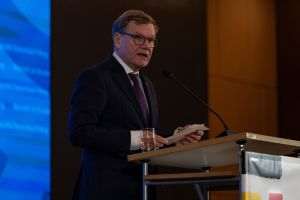Romania's transition to the single European market will not lead to a drop in prices, in the coming period, as the European Union hopes, but instead to the price of energy almost doubling, the specialists of the National Energy Regulation Authority (ANRE) and of the Romanian Academy warn, in a study launched yesterday.
The study "Energy efficiency - national priority to reduce energy poverty, increase the quality of life and the safety of energy consumers" has presented a possible scenario for the 2017-2018 period, which states that the price of electricity would near the likely European average, namely 0.227 Euros/ KWh for electricity and 0.076 Euros/ KWh for natural gas.
"Within a very short period of time (2015 - 2017/18) a shock of the rise of energy prices will follow, probably the last price hike via political decision. The price shock will be borne by the economy, but also by household budgets. The poor segment of the population will be hit very hard", the authors of the study state, and they mention that the serious social issue that Romania is currently being faced with is the deepening of the gap between the income of the population, which in 2013 amounted to approximately 40% of the median EU income, and the price of energy aligned to the European level.
In their opinion, the process of impoverishment of the Romanian population will pick up speed, as a result of the quick increase of the price of energy and will widen the gap between the living standard in Romania and EU countries.
"The rise of the price of energy will increase the number of vulnerable consumers and the spread of energy poverty among Romanian citizens. Increasing energy efficiency is the main way to cut the energy bills of household consumers. Providing the population with better information concerning the energy market and increasing the bargaining power of household energy consumers in relation to the energy suppliers could contribute to limiting energy poverty", according to the same source.
Energy poverty is defined as a person's or a household's inability to meet its minimal energy requirements: lighting, optimal home heating in the wintertime, supporting cooking facilities and ensuring access to warm water within the home, as well as using communication means that require energy to function.
• The authorities claim that almost half of the population is affected by "energy poverty"
The ANRE and the Romanian Academy think that energy poverty is mostly caused by three distinct factors: low income, the absence of infrastructure and technologies needed or their inaccessibility due to reasons other than lack of money, as well as living conditions that do not allow the efficient use of energy (especially a home with energy deficiency): "Citizens affected by energy poverty typically have low energy consumption or use polluting fuels (which are harmful both to the health of individuals directly exposed to those types of fuel, and to their environment alike) or via the difficulty of constant and in due time access to the energy sources needed for their day to day needs".
About 50% of Romania's population is "energy poor", government officials present yesterday at the event said, while Vasile Dâncu, the president of the Romanian Institute for Evaluation and Strategy, said: "Our studies have shown that only 2 out of 10 Romanians view the price they have to pay for energy as acceptable, while 8 out of 10 say, to various degrees, that they can't bear those prices".
Iulian Iancu, the president of the Commission for Industries and Services of the Chamber of Deputies, said that things have gotten to the point where the states of the world are seeing themselves forced to "redesign social and especially energy policies". He proposed a "Marshall Plan" for Romania, which would inject funds into increasing energy efficiency for homes and for buildings in general.
The authors of the quoted study think that in the current Romanian context, energy poverty is derived from a combination of four factors: the low income of the population, the hike of the price of energy, access to energy resources, and the energy characteristics of the home and of the energy provision system, respectively.
"Fuel poverty, a component of energy poverty, designates the financial inability of an individual or of a household, to sustain its expenses needed for ensuring the minimal energy needs, in the context of an accessible energy infrastructure and of modern energy provision services", according to the quoted sources, which further said: "The key concept promoted is that of vulnerable consumer, meaning the person or the household that are at risk of energy poverty caused predominantly by the deficit of financial resources".
According to the mentioned document, the risk of monopoly in various forms substantially influences the cost of energy, because consumers may not be free to choose between various providers: "Consumers often feel trapped in the system which offers access to the energy offers. In the negotiation between beneficiary and supplier, the distribution of power is very uneven. It's not just individuals that are partners in the collective negotiation with energy suppliers, but the entire collective as well. The public transparency of this negotiation is part of the policy to ensure consumer rights".
Therefore, the ANRE and the Romanian Academy have recommended greater transparency of the process for the changing of taxes and prices, and also called for mechanisms for including consumers as partners in the whole process.
Specialists have also mentioned the rethinking of the taxes included in energy prices, because taxes in Romania are among the highest in Europe. Thus, in 2013, taxes amounted to 52% of the price of natural gas in Romania.
Furthermore, the authors of the study said that, in the coming years, the hike of the price of energy will be compounded by the burden of taxes, and unavoidably, will lead to heavy pressure on rethinking the financial sources of the state budget.





















































